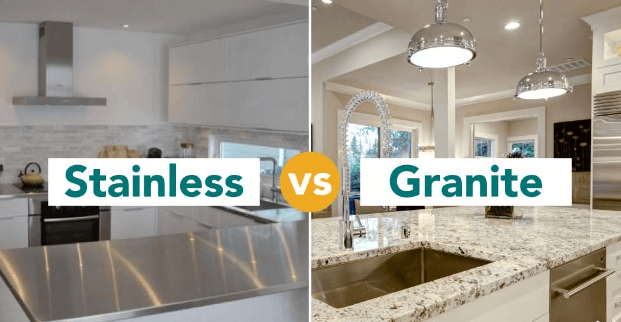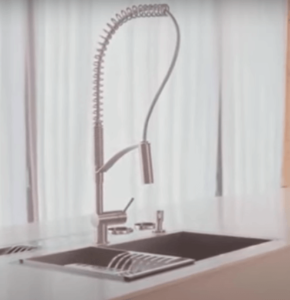Granite Composite Vs Stainless Steel Sinks

Granite composite sinks are made from a mix of granite stone and acrylic resins, providing durability and resistance to heat, scratches, and stains. Stainless steel sinks, on the other hand, offer a sleek and modern look, easy maintenance, and resistance to corrosion. When comparing Granite Composite vs. Stainless Steel Sinks, it’s crucial to consider factors like durability, aesthetics, and maintenance.
When comparing Granite Composite vs. Stainless Steel Sinks, it’s crucial to consider factors like durability, aesthetics, and maintenance.
Both types have their unique advantages and drawbacks, making it essential to understand their differences to make an informed decision for your kitchen.
We will delve deeper into the features, benefits, and drawbacks of granite composite and stainless steel sinks to help you choose the perfect option for your needs.
Understanding Sink Materials
Deciding between a granite composite and a stainless steel sink involves understanding their unique characteristics. Granite composite sinks offer a blend of durability and aesthetics, while stainless steel sinks are known for their sleek appearance and resistance to corrosion. Both options have their advantages, and the choice ultimately comes down to personal preference and needs.
Granite Composite Sink:
A granite composite sink is made from a blend of pulverized natural granite stone and a durable acrylic resin. This innovative material has become popular due to its unique blend of aesthetics and functionality.
Granite composite sinks are available in various colors and finishes, making them a versatile choice for kitchen design. The composition of granite combined with resin creates a sink that is highly durable, resistant to scratches, and easy to maintain.
Stainless Steel Sink:
A stainless steel sink is crafted from a combination of steel and chromium. This material is renowned for its sleek appearance and timeless appeal. Stainless steel sinks are valued for their resistance to corrosion, heat, and stains, making them an enduring choice for kitchens. With a wide range of styles and configurations, stainless steel sinks offer versatility and practicality in various kitchen environments.
Properties and Material Composition
When comparing properties and material composition, there are distinct differences between granite composite and stainless steel sinks.
Granite Composite Sink: – Made from pulverized natural granite and acrylic resin – Durable and resistant to scratches – Available in various colors and finishes – Offers heat resistance.
Stainless Steel Sink: – Crafted from steel and chromium – Sleek appearance with enduring appeal – Resistant to corrosion, heat, and stains. 
Versatile in terms of kitchen configurations In terms of material composition, granite composite sinks boast a unique blend of natural elements, providing a luxurious appearance and robust functionality. On the other hand, stainless steel sinks are revered for their modern aesthetic, durability, and resistance to environmental factors.
Both granite composite and stainless steel sinks have their distinctive qualities, and the choice between the two ultimately depends on individual preferences, kitchen style, and usage requirements.
Durability And Longevity
When considering a new sink for your kitchen, it’s crucial to examine the aspects of durability and longevity. Both granite composite and stainless steel sinks are popular choices, each with its own set of benefits. Let’s delve into the details to compare their durability and long-term performance.
Strength And Resilience Of Granite Composite
Granite composite sinks are crafted from a unique blend of crushed natural granite stone mixed with an acrylic resin. This innovative construction results in a sink that boasts exceptional strength and resilience. These sinks are highly resistant to scratches, chips, and stains, making them an ideal choice for high-traffic kitchens.
The material’s durability ensures that it can withstand the rigors of daily use without losing its aesthetic appeal.
Rust-resistant Properties Of Stainless Steel

Stainless steel sinks are renowned for their rust-resistant properties. This is due to the chromium content in the stainless steel, which forms a passive layer, protecting the sink from corrosion and rust. As a result, stainless steel sinks maintain their sleek appearance for long periods, ensuring they remain a durable and reliable fixture in the kitchen.
Maintenance And Long-term Performance
Both granite composite and stainless steel sinks require minimal maintenance to uphold their longevity. Granite composite sinks are effortless to clean and maintain, while stainless steel sinks are known for their resistance to tarnishing and staining. In terms of long-term performance, granite composite sinks offer exceptional durability, while stainless steel sinks, with proper care, can also deliver lasting performance.
Aesthetics And Design
Aesthetics and design are crucial considerations when choosing a sink for your kitchen. Both granite composite and stainless steel sinks offer unique attributes, making them popular choices for modern kitchens. Let’s dive into the aesthetic and design aspects of both options to help you make an informed decision for your kitchen.
Appearance And Color Options Of Granite Composite
Granite composite sinks are celebrated for their stunning visual appeal. The unique combination of natural granite stone and durable acrylic resins creates a luxurious, organic look. These sinks boast a rich, textured appearance that adds depth and character to any kitchen space.
When it comes to color options, granite composite sinks provide a diverse range to complement various kitchen styles. From bold and dramatic black to elegant shades of gray and earthy tones, these sinks offer a sophisticated color palette to enhance the overall aesthetic of your kitchen.
Sleekness And Timelessness Of Stainless Steel
Stainless steel sinks exude a sleek and timeless allure, making them a favorite choice for modern kitchen designs. Their lustrous finish and clean lines contribute to a minimalist and contemporary aesthetic, seamlessly blending with a wide range of kitchen decor styles.
Moreover, the timeless appeal of stainless steel sinks ensures that they remain a stylish and functional choice for years to come, allowing you to effortlessly update the look of your kitchen without worrying about sink compatibility.
Compatibility With Different Kitchen Styles
Both granite composite and stainless steel sinks offer versatile designs that can complement various kitchen styles. Granite composite sinks effortlessly enhance the visual appeal of traditional, transitional, and modern kitchens, providing a luxurious touch to any decor scheme.
On the other hand, stainless steel sinks harmonize with a myriad of kitchen styles, from industrial and contemporary to classic and farmhouse-inspired designs. Their adaptability makes them a popular choice for homeowners seeking a timeless and versatile sink option.
Functionality And Practicality
When deciding between a granite composite and stainless steel sink, it’s essential to consider their functionality and practicality. Each material offers unique features that cater to specific needs in the kitchen. Let’s delve into the key aspects that impact their functionality and practicality.
Heat And Scratch Resistance Of Granite Composite
Granite composite sinks are renowned for their exceptional heat and scratch resistance. Engineered from a blend of granite stone and acrylic resins, these sinks boast incredible durability, making them highly resilient to heat and scratches. The robust composition ensures that they can endure the rigors of daily use without sustaining damage.
Their ability to withstand high temperatures and resist scratches makes granite composite sinks an ideal choice for busy kitchens.
Stain And Odor Resistance Of Stainless Steel
 Stainless steel sinks excel in terms of stain and odor resistance. The non-porous surface of stainless steel prevents the absorption of odors or stains, ensuring that the sink remains hygienic and free from lingering smells. Additionally, stainless steel’s smooth surface makes it easier to wipe away any potential stains, contributing to a cleaner and more sanitary kitchen environment.
Stainless steel sinks excel in terms of stain and odor resistance. The non-porous surface of stainless steel prevents the absorption of odors or stains, ensuring that the sink remains hygienic and free from lingering smells. Additionally, stainless steel’s smooth surface makes it easier to wipe away any potential stains, contributing to a cleaner and more sanitary kitchen environment.
Ease Of Cleaning And Daily Use
Both granite composite and stainless steel sinks offer practical advantages when it comes to cleaning and daily use. Granite composite sinks are easy to clean, requiring only a gentle wipe down with mild soap and water to maintain their lustrous appearance.
Their non-porous surface prevents the buildup of grime and bacteria, simplifying the cleaning process. On the other hand, stainless steel sinks are effortless to maintain, as they are resistant to stains and retain their aesthetic appeal with regular cleaning using common household cleaners.
Additionally, their smooth surface facilitates effortless drainage and makes washing dishes a hassle-free task.
Cost And Value For Money
When it comes to choosing the right sink for your kitchen, cost and value for money are crucial factors to consider. Granite composite and stainless steel sinks are popular choices, each with their own set of advantages and disadvantages. In this section, we’ll delve into the cost and value for money aspect of these two types of sinks to help you make an informed decision.
Initial Cost And Installation Expenses For Granite Composite
Granite composite sinks typically have a higher initial cost compared to stainless steel sinks. The material and manufacturing process contribute to this higher upfront expense. Additionally, installation expenses for granite composite sinks can be higher due to their heavyweight and complexity of installation.
Price Range And Lifetime Investment Of Stainless Steel
Stainless steel sinks offer a wide price range, making them more budget-friendly compared to granite composite sinks. While the initial cost may be lower, stainless steel sinks are a lifetime investment due to their durability and longevity. They are less prone to chipping and scratching, making them a cost-effective choice in the long run.
Comparing Cost Efficiency And Return On Investment
Granite composite sinks may have a higher upfront cost and installation expenses, but their durability and aesthetic appeal can provide a good return on investment. On the other hand, stainless steel sinks offer a lower initial cost and lifetime value, making them a cost-efficient choice for homeowners looking for a durable and practical option.
Environmental Impact And Sustainability
When selecting a sink for your kitchen, it’s essential to consider the environmental impact and sustainability of the materials used. In this section, we will compare the eco-friendly attributes of granite composite and the recyclability and carbon footprint of stainless steel sinks. We will also discuss the importance of considering environmental factors in sink selection.
Eco-friendly Attributes Of Granite Composite
- Eco-friendly materials: Granite composite sinks are typically made from a blend of natural granite stone and acrylic resins. The use of natural stone reduces the environmental impact compared to sinks made from purely synthetic materials.
- Sustainable production: The manufacturing process of granite composite sinks often involves recycling waste materials from the stone industry, contributing to the reuse of resources and reducing the overall environmental footprint.
- Minimal maintenance: Granite composite sinks require less harsh chemicals for cleaning, promoting a healthier and eco-friendly cleaning routine in your kitchen.
Recyclability And Carbon Footprint Of Stainless Steel
Stainless steel is highly recyclable, with a significant portion of its content coming from recycled materials. Its long lifespan and ability to be recycled at the end of its use make it a sustainable material choice for sinks.
| Recyclability | Carbon Footprint |
| Stainless steel is 100% recyclable and can be melted down and repurposed into new products without losing its integrity. | The production of stainless steel sinks involves a relatively low carbon footprint compared to many other materials, contributing to its sustainability. |
Considering Environmental Factors In Sink Selection
Before making a decision, it’s important to consider the environmental impact and sustainability of a sink. Paying attention to the materials used, the manufacturing processes, and the potential for recycling at the end of its life can help you make an environmentally conscious choice for your kitchen sink.
Ultimately, both granite composite and stainless steel sinks have environmentally friendly attributes, and the best choice for your kitchen will depend on your specific criteria and values.
Sound And Thermal Insulation

When it comes to choosing the right sink for your kitchen, factors such as sound and thermal insulation play a crucial role in determining the overall user experience. Let’s explore how Granite Composite and Stainless Steel sinks compare in terms of soundproofing and thermal retention.
Noise Reduction Benefits Of Granite Composite
Granite composite sinks are known for their excellent noise reduction properties. The solid construction and dense material help dampen sound, minimizing the clanging and echoing often associated with metal sinks. The impact of these noise reduction benefits is an enhanced kitchen environment, providing a quieter and more peaceful washing experience.
Thermal Retention Properties Of Stainless Steel
Stainless steel sinks are valued for their superior thermal retention properties. They quickly adjust to the temperature of the water, making them suitable for both hot and cold tasks. The ability of stainless steel to efficiently retain heat or cold can be advantageous when dealing with different culinary activities, leading to improved efficiency and convenience.
Impact Of Insulation On Sink Usage Experience
When it comes to the overall user experience, the level of sound and thermal insulation can significantly impact the usability of the sink. A quieter sink can minimize disturbance, especially in open-concept spaces, while a sink with thermal retention properties can facilitate various kitchen activities more seamlessly.
Consideration of these factors is crucial in selecting a sink that aligns with your requirements and enhances your kitchen workflow.
Frequently Asked Questions For Granite Composite Vs Stainless Steel Sink
Which Sink Is Better Granite Or Stainless Steel?
Granite sinks offer a durable and elegant look, while stainless steel sinks are more affordable and easier to maintain. Ultimately, the best option depends on your personal preferences and kitchen needs. Both granite and stainless steel sinks have their own unique advantages and it’s important to consider these when making your decision.
What Is The Downside Of A Composite Sink?
The downside of a composite sink is that it can be more susceptible to scratches and heat damage. Maintenance is required to avoid stains and discoloration. Additionally, it may not have the same appearance as natural stone or stainless steel sinks. Regular care is important for longevity.
Is Granite Composite Sink Good?
Yes, granite composite sinks are good due to their durability, resistance to scratches, stains, and heat. They also offer a sleek, modern look and come in various colors to complement your kitchen. Additionally, they require minimal maintenance and are eco-friendly.
Do Granite Composite Sinks Chip Easily?
Granite composite sinks are durable and resistant to chipping. Their solid construction makes them less prone to damage. With proper care and maintenance, chipping is uncommon. Regular cleaning and gentle use can help maintain the sink’s integrity.
What Are The Benefits Of A Granite Composite Sink?
Granite composite sinks are highly durable, resistant to scratches, stains, and heat, and offer a modern aesthetic appeal to your kitchen.
Conclusion
In the end, both granite composite and stainless steel sinks have their pros and cons. When deciding which is best for your kitchen, consider factors such as durability, maintenance, and overall aesthetic appeal. Ultimately, the choice depends on your personal preferences and needs.
Whether you opt for the sleek modern look of stainless steel or the durability of granite composite, both options can enhance the functionality and style of your kitchen space.



Comments(0)